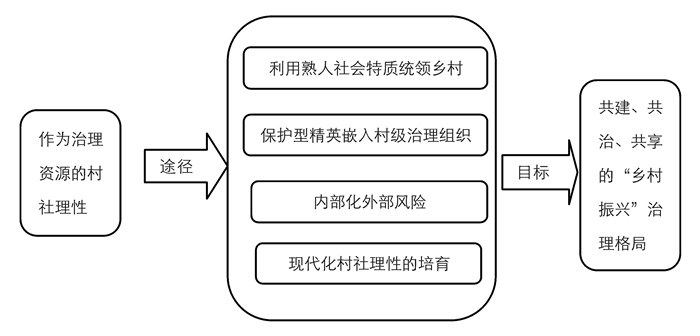全文HTML
-
十九大报告中,党中央提出“打造共建共治共享的社会治理格局”,指出要加强社区治理体系建设,推动社会治理重心向基层下移,发挥社会组织作用,实现政府治理和社会调节、居民自治良性互动[1]。表现在乡村振兴中,就是在完善党委领导和法制保障的治理格局下,通过政府、村域社区、农民的共同努力,在充分发挥乡村内源动力的基础上实现乡村振兴。唯物辩证法告诉我们:事物发展的根本动力来自内源。乡村发展也不例外,它在本质上遵循的是一种内源式发展路径。这种内源式发展强调了乡村的发展主体地位,注重对内部资源的利用。乡村振兴的内源式建设就是通过制度创新,激活乡村内部的发展能力,形成强大的内源动力机制,在这种核心动力主导作用下完成自组织演化过程。并且通过自组织地深度参与,以产业升级实现村庄整体性变迁。其中自组织是指以组织化形式对抗外部风险,深度参与是要坚持乡村在发展中的主导地位,产业升级是乡村振兴的核心。而这些正是村社理性发挥优势的方面。
村社理性是一个集体层次概念,它内生于乡村内部,是村社作为一个共同体,在长期的生活生产实践中,所形成的谋求村社整体权益最大化的属性。新时代的村社理性是指:建立在村社集体所有权和农户使用权两权分离的经济制度基础上的、以农村一定范围内的血缘和地缘关系为纽带的、维系村社内部社会秩序的群体理性[2]。它包含了韦伯意义上的工具理性、价值理性和乡土规范的传统理性。它具有的多重属性正是乡村振兴中关键的几个环节。乡民在长期的一起生产生活中,经过多次博弈而达到的有效制约孕育出的村社工具理性,能以较低的成本把农民组织起来。而基于血缘、地缘形成的村社价值理性,具有保护型经纪的功效,有利于乡村深度参与,建立可持续的发展机制。村社理性中的熟人社会的特质,模糊化利益,有利于产业升级过程中内部化外部风险。
村社理性来源于经济学中的“理性人”概念,它重视对自身资源的有效利用,强调治理的低成本。温铁军最早提出,它是以乡土社会中的村社地缘关系为产权边界,存在着农户成员权在村社共同体的集合代理,据此而形成的是户村两级地权结构,这是一种内部非排他性的、体现社区成员权的农村产权[3]。随着研究的深入,有学者对村社理性的内涵进行挖掘。徐嘉鸿、贾林州指出,已有的村社理性只关注了工具理性,而缺乏价值理性关联。村社制度所内含的,除了长期演进的重复博弈结构中,形成的具有工具理性特质的“队生产”形态(组织租),还包括以血缘认同和村落共同体的文化认同为基础的,具有价值理性性质的交换与协作行为以及以家庭伦理为核心的代际协作与代际剥削现象[2]。村社理性提出后,研究主要集中在它的功能方面。最初是它的核心功能-降低交易成本方面。温铁军等以此分析了村社与外部主体的交易行为,认为这种理性能够进行各种制度创新,来内部化负外部性,降低与外部主体的交易成本。指出改革初期苏南乡镇企业发展模式:通过社队内部自我剥夺,以劳动和管理协调替代资本投入,完成原始积累,是一种典型的村社理性[4]。随后董筱丹、温铁军又通过引入组织租概念,研究了村社内部合作行为,认为:组织等同于资本、劳动、技术等生产要素,具备“租”的效用。村社内部经过多次博弈,自由选择,最终确定具有组织租的领域进行合作,也是村社理性的一种体现[5]。除了核心功能外,有学者还研究了它的保护型经纪功效。陈靖认为,在以村社理性为主导的发展模式下,村社共同体利益能够最大化地得以保持,免受资本与国家的过度攫取,发展利益也能在社区内最大化[6]。何慧丽指出村社理性对宏观经济的功效:当发生现代性的经济危机后,村社理性具有使其“软着陆”功效[7]。
在前人研究的基础上,本文还关注了村社理性在现代化背景下的新变化。并以一个村庄内源式发展的调研为依托,研究了乡村振兴的内源式建设路径。长期的共同生活中,乡村培养了内在的结构和权威、动员机制,逐渐形成较强的村社理性,成为乡村治理的有效资源。特别是后税费时期,随着农村政策导向从“汲取型”向“反哺”型的转变,村社理性从制度性和功能性的束缚中解放出来。有效地利用这种力量,不仅可以降低乡村治理成本,还可以更好更快地实现乡村振兴。
-
山西省晋中市李村①离乡镇政府5公里,2002年有307户,人口909人,基本耕地2 298亩,以种植业为主,人均收入5 000元左右。是一个典型的平川小村,发展情况在县属于中等。通过前期对区位条件、收入结构、产业基础、发展潜力等几方面的比较分析,李村在当地具有一定的代表性。2002年左右,为减轻农民负担,国家推行了农村税费改革,精简了部分机构,降低了税率,农民的生产投资性显著提高。但是在具体的执行过程中,也出现一些不利情况:乡村各级治理机构可用财力急剧减少,一些公益性的生产服务性事务无法正常运转。而一事一议与乡村基层治理生态不尽符合,难以发挥应用的功能,无法通过它实行公益性事务的筹款。在这一大背景下,村里的井电使用权、灌溉设备等一些集体财产,全部拍卖给个人,村集体基本上被抽空。水利设施由个体主管,并没有带来生产效率的提高。在施行一段时间后,发现个人管理的后果是一切以个体盈利为主,水价上涨,当时一亩地一水是70~80元,有时甚至上涨到100元,而且权力集中到个人手里,使用很不方便,老百姓花钱都浇不上水。村委会尝试控制价格,但承包人把成本转嫁给农民,在抽水泵上钻孔,使浇地时间延长,管理十分困难。因为用水的不便,严重影响农民种地积极性,当时村里撂荒土地特别多,农业陷入停滞。村委会因自身治理资源缺乏,组织运作低效率,陷入一种治理困境。
① 具体名称已根据学术惯例处理。
乡村衰落现象一直持续了五年。在此期间,村民逐渐认识到,依靠过去行政强制完成公益性事务的筹款已不可取。只有依靠基于共同利益而内聚的乡村社会资本,才有可能完成统领乡村事务的功能。2007年经过村两委和村民多次协商,反复论证,最终决定成立井电合作社,给全体村民低成本提供水利灌溉服务。具体做法是由56名成员发起,出资80万元,把承包出去的19眼井电使用权,又从个人手里买回到合作社。合作社现有维修人员3人,管理人员4人。目前浇水的成本下降到一亩一水30~40元,是个人承包时成本的一半。水利灌溉的便利极大地改善了农业生产。
因为用水方便,农作物产量上升,玉米平均每亩1 500斤,最高可达1 700~1 800斤。为增加农业收入,村委会又组织大家调整了种植结构,以水果蔬菜为主,果树近1 000亩,蔬菜700亩左右。2016年,为发挥规模效应,村组织又以土地托管的形式流转整合了本村500亩土地,引进外来资本,建成苗圃基地。农民们的农业收入因此而提高。在农业发展的基础上,围绕本村特色产业,制造业和服务业也得到初步发展,一户成立了水泵厂,向本村井电合作社和其他村提供产品,吸收了本村部分剩余劳动力。发展多个采摘园,一家快递公司,形成一二三产业融合发展的态势。为更好地发挥井电合作社的溢出功能,村两委以优惠价格向养殖户提供用水服务,鼓励全村70多家搞起了养殖业。这些养殖户除了自己经营外,还负责提供全村的农家肥,目前全村很少有家庭施复合肥,地力得以恢复。李村生态农业和农民增收同步发展,农民个人年均收入从2007年的4 000~5 000元,增加到2016年的近20 000元。李村的发展是国家扶持较少的条件下,依靠乡村自身资源的内源式发展。
-
李村的这种内源式乡村振兴之路,所依靠的资源来源于村社理性,它发挥功能的机制具体如下:
-
社会化大生产时期的农业振兴,需要改变过去分散、独立的小农生产方式,增强小农的组织性,这是农业发展到一定阶段的必然规律。另一方面,市场化越来越深入地影响到乡村,当国家和市场不能提供足够高的保障水平时,农民又会转而回归村庄集体,寻找安全性框架,这也是农村发展的内在要求。当前振兴乡村的一个主要任务就是通过乡村内部合作改变与外部规模主体的权利结构,从而增强小农的抗风险性,增加更多的收益。但是选择何种领域合作,如何降低合作成本,如何实现稳定合作是当前乡村治理的难题。温铁军等人从组织租的角度做了解释:经济规模小的主体通过合作行动,会使总产出增加;因为合作往往要在一定的组织框架内进行,这个借由合作获得的产出增量,即为合作者获得的“组织租”[5]。只有组织租大于组织成本时,合作社员彼此形成一个利益结合紧密的连接机制,乡村合作才有可能。
而村社理性能够寻找到具有组织租的合作领域。与农业生产和农村生活密切相关的村社理性,主要体现在单家独户之外、需集结众家之力才能办成的领域,如治安团防和水利灌溉[5]。李村书记说:当今的发展趋势不能离开集体经济。但按照人民公社时期武断地组织合作社不可取。应该需要合作的领域就合作,该单干的领域就单干。资本主导的合作社中,农民只是一个利用的工具,无法获取合作收益。另一方面合作社需要一步一步搞,如果农民认识还达不到,也不行。比如村里就有几户搞过养殖合作社:统一购买原料没问题,但统一销售这一块就困难不少。经过周密考虑,认识到水利是农业的命脉,水利搞不好,农业就发展不了,其他就更无从谈起,因此首先建立了水利服务合作社。在管理方式上,既不同于人民公社时期的合作形式,也不同于当下名实不符的合作社。在保留人民公社时期低成本、规范管理、合作用水的优势下,结合当今实际作了调整,实行刷卡用水。而且合作社只管提供水利服务,其他生产经营并不干涉,农民的个体积极性也能得到很好保护。井电合作社与每个村民都有紧密的连接机制,农民只有通过合作社才能享受到低成本的农业用水,合作社的组织租最大程度惠顾在每个社员身上。
村社理性不仅体现到在具有正向组织租的领域进行合作,还降低了合作的成本。村社理性立足于传统社会资本,交往偏好于村落和家庭,邻里熟人等“强关系”范围之内的“内倾型关系网络”,以及镶嵌在此中的“差序式”特殊信任和奠基于“乡民意识”(传统文化、公社文化)基础上的“无我”价值取向[8]。它基于村民长期相互交往形成的关系网络和社会信任,可以高效率、低投入地反应村民意愿,聚合村民利益。
生产领域的合作增强了村庄的凝聚力,井电合作社以农业生产的水利服务为切入点,将分散在各地的农民重新组织回农业生产中。实行井电合作社之后,农业用水极为方便廉价,考虑到外地打工的成本和收益,全村目前除外出打工的100多人,剩下的800多人都忙于农业,并越来越多地关注涉及共同利益的乡村事务,在实行中社区共同体的观念潜移默化为村民意识。通过维护村域社区的整体利益和个人福利,农民加强了对社区的认同。在井电合作社筹划和运行过程中,积极组织村民进行了充分的讨论。在定期的村民会议中,村民的参与能力得到提高,一些隐性的治理资源显性化,从长远来看它将会使村民更好地理解民主和治理理念,为乡政的健康发展打下基础。井电合作社以具有社区基础的合作为依托,在降低农业生产成本的前提下统合村域社会,并在此中实现了社会的“利益集结”,增强了村庄发展的凝聚力。而这一点正是依靠村社理性寻找到,具有组织租的领域进行合作达到的。
-
在组织起来的基础之上,乡村振兴还需要一个有效的治理权威,带领乡村深度参与。乡村作为一个长期共同体已形成较强的自主性,这种自主性代表着一种不可被任何群体或个人所独占的集体利益,因此,产生的乡村权威是一个能最大程度地维护这种自主性,一个能主持公道的组织或个人。村社理性基于共同的传统、风俗,表现出对本社区拥有强烈的认同意识。它所孕育出的治理权威,具有保护性的特征。
李村作为自然聚居形成的村落已有几百年的历史,在长期的治理实践中,村庄治理权威的产生总是满足以下几个条件:首先必须是本村人,这是基于双向的了解;其次必须是保护型经纪动力强,确实能增进全村的福利;最后必须是能人,不同的时代,能人的内涵也不同。这种村社理性具有极强的生命力,即使是国家政权强力介入的人民公社时期,李村村长也能最大程度地发挥保护型经纪的功能。随着村民自治的推行,村社理性在此发挥的作用越来越明显。在村里的调研中,村民也都说:在一起住,知根知底,谁能给村里人办实事,主持公道就选谁。保护型精英使乡村的发展更多地立足于本村的整体利益。特别是目前党政一肩挑的实际情况,在国家和农民共享一套价值符号的前提下,客观上有利于二者之间的互动。这种内生于乡村自身的体制内精英既有对国家政策的了解,又深谙本村民情民意,促进了各项工作的开展。
保护型精英带领的乡村振兴,始终把村社利益最大化作为行动依据。井电合作社成立后,保护型精英依靠便捷低成本的农业用水,以市场为导向,积极组织村民进行种植结构的调整,引入水果、蔬菜等附加值高的经济作物,极大地增加了村民的收入。2016年,为发挥规模效应,村组织又以土地托管的形式流转整合了本村500亩土地,吸引外来资本,进行产业升级。在引进资本过程中,为避免外来资本的过度掠夺,李村村组织通过压缩资本的盈利空间和运行界限来保障村民和村社利益,规定只有符合本村经营周期、经营项目等要求的产业,才可以进入。经过充分论证,认为苗圃基地是劳动密集型产业,收益稳定,又能吸收本村劳动力,溢出效应也能带动本村小规模承包者的产业升级,决定发展苗圃基地。农业的兴旺吸引了很多外出打工的人回乡创业,围绕本村特色产业,第二和第三产业也得到发展,形成产业融合发展的态势。在生产发展的同时,村委注重生态环境,以优惠价格向养殖户提供用水服务,条件是低价提供全村的农家肥的供应。
在产业升级转型的过程中,保护型精英始终把乡村置于主导地位,将外来资本作为有益的补充,避免了资本下乡中掠夺式发展,将村庄的发展与每个村民建立起密切的联系,实现对乡村振兴的深度参与;将村庄整体福利的增长作为发展的目标,建立了可持续的发展机制。
-
资本是产业升级中不可缺少的要素,但受限于我国国情,资本稀缺是农村发展的普遍情况。依靠外来资本,又带来一系列不可控的风险。如何有效安全地获取资本是农村产业升级过程需要迫切解决的问题。在这方面,村社理性可以发挥积极的作用,村落中熟人社会的特质,模糊化利益,可以以内部化机制化解发展的外部性风险。
在资金积累方面,村社理性也发挥了有效的作用。李村井电合作社最初的80万元中,构成形式是:5户大户共出资10万,20户中户共出资20万元,剩下的50万,并没有实际现金入股,而是普通农户以土地承包权、使用权和劳动力等形式入股。这样一方面通过劳动力剩余价值的社区内部转化,社区土地资源的自我资本化,内部化外部筹资风险;另一方面也利于以后的土地流转,为产业升级顺利实现奠定了基础。在井电合作社最初成立的2007年到2015年,前期的工作主要是修井、换泵,全部淘汰旧的井管线,一直负债经营。因为缺少必要的抵押,无法获取银行的贷款。在这种情况下,主要由合作社内的精英,通过其他产业经营利润填补。
在发展苗圃产业时,为形成规模化,吸引外来资本,李村进行了土地流转。与常规的村庄土地流转方式不同,李村的土地流转是在自愿的基础上,先统一流转到保护型经纪人名下,再由保护型经纪人以土地作为主要股份,引进外来资本,共同发展苗圃产业。农民从保护型经纪人手里获取本地最高土地租金,并且每年随着粮价的上涨而增加。这样一方面降低了外来资本和分散小农的交易成本[9],另一方面将农民与外来资本的交易风险内部化。
-
村社理性是动态发展的,随着国家政权的建设和市场经济的深入,村社理性也得到发展。融入不少现代性因素。乡村治理演变过程中,农民参与乡村治理的力度几经波折并得到回升。新中国成立初期到1978年,传统文化的结构发生了变化,作为传统文化核心和基础的村落家族文化受到冲击,农村传统的思想价值观念也受到影响[10]。这在客观上有利于村社理性中民主意识的发育。特别是改革后,村民自治的推行,提升了农民的民主管理水平。井电合作社组织机构健全,各司其职,有利于发挥村社理性的监督和指导作用。李村《井电合作社章程》第十九条规定:本组织的机构由成员大会、理事会、监事会构成。其中成员大会是本组织的最高权力机构,由全体成员组成,具有选举和罢免理事长、理事会和监事会成员的权力。决定本组织重大财产处置、对外投资、对外担保和其他生产经营活动中的其他重大事项,决定聘任本组织主要经营管理人员和财务会计的人员资格的核心权力。井电合作社是在县经济指导委员指导下成立的。运行规范,财产权益明晰,《井电合作社章程》第五条规定:本组织成员认购的股金归各该成员所有。本组织存续期间由公共积累形成的财产,按照成员与本组织业务交易量和成员认购的股金依比例折股量化为每个成员的所有份额,由国家财政直接补助形成的财产按照国家规定处理。本组织成员以前款规定的财产对本组织负责。
一. 利用熟人社会特质,低成本地整合乡村,实现乡村振兴统的基础
二. 通过保护型精英嵌入村级治理组织,建立可持续发展机制
三. 采用内部化机制化解外部经济风险,为产业升级创造了条件
四. 加强现代性村社理性的建设,保证了乡村振兴与国家发展一致的方向
-
乡村振兴是党中央在新形势下,以农民为中心提出的一种乡村发展新理念。它是“健全人民当家作主制度体系,发展社会主义民主政治”[1]在乡村治理中的体现。它主张乡村发展要充分体现广大农民的意志、切实落实农民的各项权益、有效激发农民自身的积极性,构建完善的制度体系保证农民在乡村振兴中的主体地位。这就需要从乡村内部寻找乡村振兴的动力。
作为一个村民长期生活的区域,乡村中的反复博弈、完全信息、有效制约等机制形成了较强的村社工具理性,使得村社组织可以降低组织成本,更快实现乡村基本公共物品的供给。基于血缘的村社理性可以内部化外部风险,通过内部剥夺完成资本积累,实现产业升级。村社价值理性孕育出保护型经纪,使发展的利益最大程度保留在乡村,有利于恢复农村的广义生态环境和宏观社会资本水平。因此要重视村社理性在乡村振兴中的积极作用,在尊重乡村自主性的前提下,保留传统村社理性中的精华,积极培育现代性的村社理性。具体从以下几方面入手:
-
通过加强农民经济合作,增强凝聚力,振兴乡村,已成为共识。合作经济在一定程度上,不仅可以减少农民对外部市场的依赖,避免风险,使乡村的经济主权掌握在农民自己手中;另一方面,具有互助性质的合作经济发展与社会治理之间存在着交互效用。马塞尔·莫思指出,长期的交换活动同时也是一个社会资本积累的过程,能够引进并强化社会的规范结构,从而调节群体社会生活,使人与人之间有时甚至带有一定的利他性[11]。社区组织在社区发展中起着重要作用,它们能够培育社会资本,促进信任和合作,同时也能够提供多样化的产品和服务,提升社区福利水平[12],最终增强乡村凝聚力。
但选择何种领域进行合作,采取何种方式进行合作,在实践中,依然有许多问题需要解决。当今时代,农民因打工分散在各地,从社会根基上动摇了村社理性的可持续机制。目前政府扶持的一部分合作,投入大量的资金,效果却不明显。而乡村社会中,农民自发的组织,往往生而不长,作用有限,难以带动农村进入善治的轨道。这就需要有效对接国家和社会两种力量。首先,政府应当鼓励农业生产中的灌溉,农民创业发展中的金融等一系列乡村发展中命脉领域的合作,这些是农业生产、农村发展的基础,农民有内生型的合作需求,而且可以起到“有限的资源注入,激活乡村无穷潜力”的效果;其次,应当尊重农民的首创精神,对农村自发出现的合作组织,只要有利于改善乡村治理的,就坚持“引导”而“不领导”的原则;再次,有效的制度供给,消除不利于健康合作组织的制度性障碍,保障农民自组织的法律地位和各项权利,切实转变乡镇政府管治思维,以全新的治理理念构建治理体系,在产业体系、生产体系、经营体系等方面加强社会化服务和政策支持,健全内部激励机制,完善合作社利益,落实共享教育。
-
村社理性的变现能力取决于保护型的乡村精英。传统“乡村精英”指的是在经济资源、政治地位、社会关系、社区威信、办事能力等方面具有相对优势,具有较强的自我意识与参与意识,并对当地的发展具有较大影响或推动作用的村民[13]。与传统精英不同,当代保护型精英更注重乡村的整体发展。但随着城镇化的推进,年轻一代的乡村精英普遍流入城市。而受市场化的影响,现在留在乡村的精英保护型经纪动力不足。李村书记也说:目前选出一个合适的带头人很难。年轻的一代主要嫌个人收益不足,但是我们考虑的是他的能力。要想培养后备力量,一方面要提高待遇,另一方面,我们也需要多方考核,看他是否胜任。但是目前符合我们要求的人,在村里可以说很少。
针对乡村精英的缺失,虽然国家先后推出大学生村官、驻村干部等制度,采取从外部引入精英的方式。十九大报告也指出,实施乡村振兴战略必须加强农村基层基础工作,培养造就一支懂农业、爱农村、爱农民的“三农”工作队伍。这些在改善乡村治理方面,发挥了一定的作用。但普遍存在精英干不长,乡村没把精英当作自家人等不足。因此工作思路需要从“引入乡村精英”转变为“从乡村内部培养精英”的方式。本着“从农村中来,到农村中去”的原则,要调动乡村的经济能人、大学生、退伍军人等乡村人才参与到乡村振兴中来。提供政策鼓励,平台搭建,资金支持,创造有利于乡村保护型精英学习、成长、锻炼的条件。发挥他们变现村社理性的作用。
此外,如何使乡村精英在乡村振兴中发挥保护型功能,在实践中仍有许多问题要解决。十九大报告中提出:加强社会治理制度建设,完善党委领导、政府负责、社会协同、公众参与、法治保障的社会治理体制,提高社会治理社会化、法治化、智能化、专业化水平[1]。对这个问题有很好的指导作用。首先要健全乡村精英级进入治理中心机制,在党委的领导下,群众的监督下,使那些真正有意愿,有能力振兴乡村的精英进入领导岗位;其次规范治理体系,增强透明度,建立能上能下机制,保证精英的执政不偏离广大村民的利益;最后完善法治保障,对那些违背国家政策,侵犯农民利益的精英违法行为,严惩不贷。
-
振兴乡村的主体是村社共同体全部成员,成员整体的素质通过村社理性影响着乡村振兴。现代性改变了过去村社成长的环境,同传统的乡村社区相比,当下乡村已不是封闭、固化的行动模式。在与乡村外部的交流中,各种新的元素影响到每个社员。一方面我们应该肯定,目前村民的整体素质在不断提高。但是在与社区外部的互动中,同时也存在着仪式文化不在场、民风衰落、文化建设短视化问题。一些不适合的文化被盲目引进乡村,而一些落后的传统文化依然有一定的市场,这些都不利于村社理性的健康成长。因此要通过现代化的人才培养模式,大力培育乡村文化建设的主体,实行有策略分类型提升农民工人力资本、构建文化课堂工程[14],要建立人才的双向流动机制,既要鼓励农民走出去打工,也要欢迎农民返乡创业,同时还要吸引城市居民建设乡村,将大量现代性先进要素引入乡村。要提高乡村社区开放性水平,保留传统精华的基础上,吸收一切有益的成分。要以是否有益于乡村善治为标准,培育现代性的村社理性。




 下载:
下载: